Should You Repair or Replace a Leaking AC?
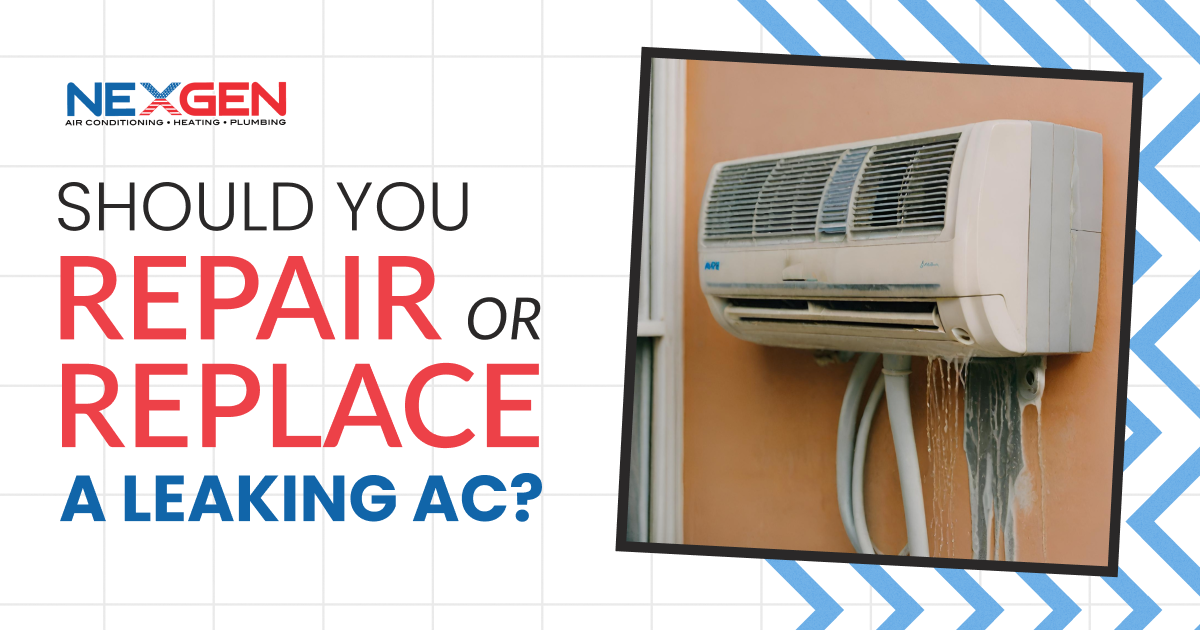
A refrigerant leak is a major problem and can leave you wondering whether to repair or replace your leaking AC. You’ll need an AC repair professional to help you decide. Refrigerant is a fluid that enables your air conditioner to cool down your home. Any AC unit can develop a leak, regardless of its age, due to corrosion, temperature extremes, and damage to coils. A leak should be considered an emergency; AC refrigerant is toxic and a loss of coolant can damage the system.
We’ll look at the following factors to help decide if a refrigerant leak warrants an AC repair or replacement:
Age of the System
Refrigerant leaks are more common in air conditioners that are five years old or more. Repair the issue if the system is relatively young. It probably has a fair amount of life left, especially if it’s less than 10 years old, so repairing a leak should be worthwhile. However, if you have an older AC, finding replacement parts may be prohibitively costly.
Cost of the Repair
A refrigerant leak can cause a considerable amount of damage. If it’s been occurring for a while, a lack of refrigerant has probably strained the system to the point major components like the compressor can fail. A compressor can be replaced. However, if your system is old and no longer under warranty, this approach is expensive.
Repairing a refrigerant leak can cost under $200 if the fix is simple. More complex jobs can cost $1,000 or more. If the job is complex and labor-intensive enough, it can cost nearly as much as replacing the entire system. As a general rule, choose a replacement if a repair estimate exceeds 50% of the price of a new unit. Or, multiply the repair cost by the unit’s age; if the result is $5,000+, replacement is more cost-effective.
Your Old AC Still Uses R-22
If your air conditioner is over 10 years old, it may use R-22 refrigerant. This product can no longer be produced legally in the U.S. Finding R-22 is extremely costly and most technicians won’t consider doing so. A more environmentally friendly refrigerant, R-410A, is readily available but can only be used in new ACs. You’re better off replacing an old AC that’s leaking.
The Cost of Your Energy Bills
How much do you spend on energy each month? Older ACs are generally less efficient than new units and even less so if there’s a leak. A technician can evaluate your system’s general efficiency rating and whether it’s properly sized for your home. If not, and several parts are worn out, and your energy bills keep going up, investing in a new AC can save you over time.
Efficiency ratings have changed over the years. Older units have lower SEER ratings, but modern ones must be rated at least 14 SEER in the North and 15 SEER in the South (as of 2023). High-efficiency models are rated at 20 SEER or higher.
Are You Planning on Moving?
If an AC repair to fix a leak isn’t prohibitively expensive, and you plan on moving within the next few years, you may not want to invest in a replacement. However, think of the condition of the system. If it’s been poorly maintained and in disrepair, not replacing it can reduce the sale price of your home. Even if you’re not planning on leaving, replacing it can provide peace of mind and avoid dealing with the hassle later.
Do the Indoor and Outdoor Units Match?
Indoor and outdoor AC units should be the same brand and model, but this isn’t always the case. If one component was replaced after the other, they may be incompatible, causing the system to run less smoothly and efficiently. And, if there’s a refrigerant leak, paying for a costly repair isn’t worth it. Installing a new, high-efficiency, perfectly matched system will save you energy and maintenance costs for many years.
Is It Still Under Warranty?
If the system is still under warranty, most repairs are worth it. But if the warranty has expired or is invalid, repairing a leak can be very expensive. Plus, if it’s out-of-warranty, chances are the unit has either been neglected or is too old to consider repairing. However, if you have an extended warranty and have properly maintained the system, that can delay your decision to replace it.
Contact NexGen for AC Repair or Replacement
NexGen provides AC repairs involving refrigerant leaks, condensate line clogs, and any other problems that arise. We also specialize in plumbing leak detection and repair. Our technicians are fully licensed and insured and available 24/7 for emergencies. They can diagnose and fix any problem and advise you on whether to replace an aging system. For high-quality AC repairs and free estimates in Southern California, call (805) 301-6788 today.
Source:
How to Pick the Best Air Conditioner Installation Contractor

Picking the best air conditioner installation contractor can be a challenge. There are thousands of AC contractors in California. Not all are qualified to meet your needs. Only with the proper expertise and equipment can an installer ensure a system will work safely, reliably, and efficiently. However, you can take a few steps to find the right air conditioner installation company.
Working with a professional AC contractor is important for many reasons. It ensures your safety and well-being as air conditioner installation is a delicate process. A dependable cooling system is also an investment; when correctly installed, it will keep your household comfortable for many years.
That being said, here’s how you can find a qualified air conditioning installer:
Know What You Need a Technician For
Gather basic information you can provide a contractor when you call them, such as:
- The make and model of your AC system
- The date it was installed and last serviced
- The square footage of your home
Knowing the company that installed and serviced the unit can help. At the very least, it will provide the new contractor with some useful details. Or, you can try contacting the original installer if it’s still in business.
Ask Someone Who Knows
If a family member, friend, colleague, or neighbor has previously recommended a home services company, and you weren’t disappointed, ask if they’d recommend an AC installer. You can also try contacting local trade organizations. They can provide you with names of members that meet their standards. Once you have a list of company names recommended by a trusted source, you can begin your research.
Read Online Reviews
If all else fails, online reviews are abundant. You can find them by using search terms such as “best air conditioner installation contractors near me” or “AC installation in Los Angeles”.
When reading reviews, look for write-ups on the type of installation you need. A negative review here and there doesn’t necessarily disqualify a contractor. The reviewer’s home and installation requirements may have differed completely from yours. For example, they may have dealt with incompatible equipment or an outdated duct system that had to be replaced. Or, they may have unreasonably expected the contractor to replace a part that was no longer available.
Therefore, if you want to update to a more energy-efficient unit or a zoned AC system, look for customers who have hired the company for such services.
Check Licenses and Certifications
A contractor must acquire a license from the state of California. To become licensed, a technician must complete an HVAC educational program and on-the-job training and have at least four years of journeyman-level experience. Other credentials a contractor should have include North American Technician Excellence and U.S. Environmental Protection Agency (EPA) certification.
Don’t Go for the Lowest Price
You won’t necessarily receive the best quality service. Always check what you’re getting for the quoted price. If the company provides subpar service, cuts corners, or uses lower-quality equipment/materials, you’ll pay more later for repairs or an early replacement. Exceptional service may cost more upfront but will save you in the long term. However, asking about special offers and rebates is a good idea.
Evaluate a Prospective Contractor’s Quality of Service
To evaluate an air conditioner installation contractor’s quality of service, look at how they handle their process. For example, you should look for the following in a reputable AC installer:
- Home Evaluation: The contractor should visit your home and determine its square footage, the number and location of windows and doors, and other variables to decide on the right type and size of AC unit to install.
- Itemized Written Estimate: Get every estimate in writing. A verbal agreement is not enough to ensure you receive top-quality service. It’s a sign of an inexperienced technician. Ask for an estimate in writing that includes every aspect of the project, including the AC model, its cost, efficiency, and warranty.
- ENERGY STAR Equipment: Look for an AC installer that provides ENERGY STAR products. These meet the latest energy efficiency guidelines and have the potential to yield the most significant long-term savings. The contractor should calculate the potential savings of any equipment they suggest installing.
- Communication Skills: Any air conditioner installation contractor should be eager to answer your questions. They should possess a professional demeanor and explain every option and step of the process. A contractor’s primary goal should be to ensure the customer’s satisfaction.
Ask Questions
Before hiring an AC installer, ask how long they’ve been operating, whether they’re licensed and insured, and what training and qualifications their technicians have. Also, ask about warranty details and if they work with an AC brand you prefer. Inquire whether you’ll be billed for the estimate as well. A free estimate saves you money if the contractor cannot install a unit that meets your needs or you’re not satisfied with their quote or quality of service.
Contact NexGen for High-Quality Air Conditioner Installation
NexGen is a leading AC installation company in Southern California. We help customers decide on a new system and safely and correctly install the latest, high-efficiency ACs. You can benefit from lower energy bills, reduced maintenance costs, and increased comfort and indoor air quality. For help determining the best system for your home and to request a free quote for air conditioner installation, call NexGen at (833) 729-9735 today.
When to Schedule Home Air Duct Cleaning Services
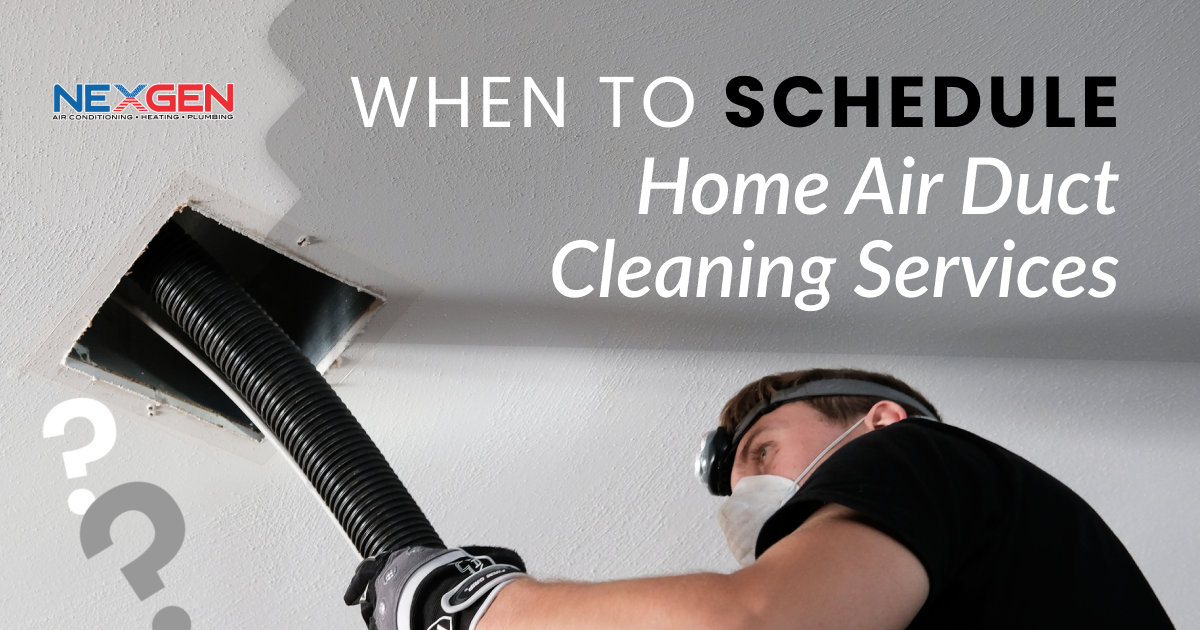
Homeowners concerned about indoor air quality are often unsure when to schedule an air duct cleaning service. Experts generally suggest it every three to five years. It’s not needed annually or more frequently like an AC tune-up, assuming you change the filters regularly and stay current with HVAC maintenance.
Many pollutants can be collected in your ductwork. Some, like smoke particles, volatile organic compounds, mold, chemicals, pesticides, etc., can be harmful. Contamination may also reduce HVAC performance and efficiency. Therefore, following our advice for scheduling air duct cleaning services can be beneficial.
When Is Best to Consider Air Duct Cleaning?
Since there’s no solid guideline on when to clean air ducts, it can be difficult to know when to call a contractor. But requesting the help of a ductwork professional is a good idea if:
- Your Ductwork Has Never Been Cleaned: Perhaps it’s been years, or decades, since your air ducts were installed, or they haven’t been professionally cleaned since you moved into your home. We suggest at least scheduling an inspection to see if your ducts are dirty.
- You’ve Recently Renovated/Remodeled Your Home: Dust and debris easily become airborne during renovation or remodeling work and can be blown into air ducts. Once inside, contamination can build up and recirculate.
- There’s Construction Near Your Home: Construction creates dust and particles that can find their way into your home and HVAC ducts. If your home is near a construction site, consider having your air ducts checked, and if necessary, cleaned.
- High Air Pollution Affects Your Area: Polluted air can contain particulates, smoke, and chemicals that can enter your home in many ways. If your city or community often experiences low air quality, consider more frequent duct cleaning.
- It’s a Season You Don’t Need the System: You can’t use your HVAC system while the duct cleaning company is working. Therefore, we recommend scheduling an air duct cleaning service in the spring or fall. It generally takes just a few hours and avoids being without your AC or heater during a hot or cold day.
Signs You Should Schedule Duct Cleaning Now
There are also more obvious signs that air duct cleaning would be beneficial. Schedule service with a local HVAC company if:
- Mold Is Growing Around Vents: If vents are moldy or have dark spots, mold is likely inside the ductwork and circulating. Left unchecked, mold growth can cause serious health issues and damage your HVAC system.
- Air Vents Are Dusty: Dusty vents can indicate widespread contamination in your ductwork and potential clogs. Call for help if dust and debris are collecting around air vents and are visible inside them.
- Odors Are Noticeable Throughout Your Home: Musty or stale odors can come from contaminated ductwork. Duct cleaning can remove the materials and substances that are causing them.
- There Are Insects or Rodents In Your Ducts: If you hear strange sounds or see insects, rodents, or their associated waste and debris, there’s a risk of serious air quality problems. Schedule a duct cleaning to remove pests and clean and sanitize your ducts.
- Your HVAC System’s Performance Declines: Call a ductwork professional if your home isn’t reaching the right temperature, airflow seems limited, or your HVAC unit runs constantly. They can clear clogged ducts to restore normal performance.
What Does the EPA Say?
The U.S. Environmental Protection Agency (EPA) admits cleaning air ducts doesn’t guarantee better indoor air quality. Pollutants can enter your home from many sources. Cleaning, cooking, and other activities can contribute to indoor air contamination. The EPA also notes the conditions in every home are different. So, whether your house is dusty, you suffer from allergies or unexplained symptoms, or odors are present, it may be helpful to inspect your air ducts. If they’re contaminated, air duct cleaning can resolve indoor air quality problems—if it’s done properly.
Call NexGen for Home Air Duct Cleaning Services in Southern California
A leading HVAC company in the region, NexGen performs air duct cleaning that can remove harmful particles, debris, and other pollutants. Our fully licensed, insured technicians use HEPA vacuums and deodorizing methods to clean and sanitize ductwork. In addition, we can clear blockages, seal leaks, and repair ductwork. For affordable air duct cleaning services in Los Angeles, Orange County, and surrounding areas, call (833) 729-9735 today.
Can I Perform Ductless Mini-Split Maintenance Myself?
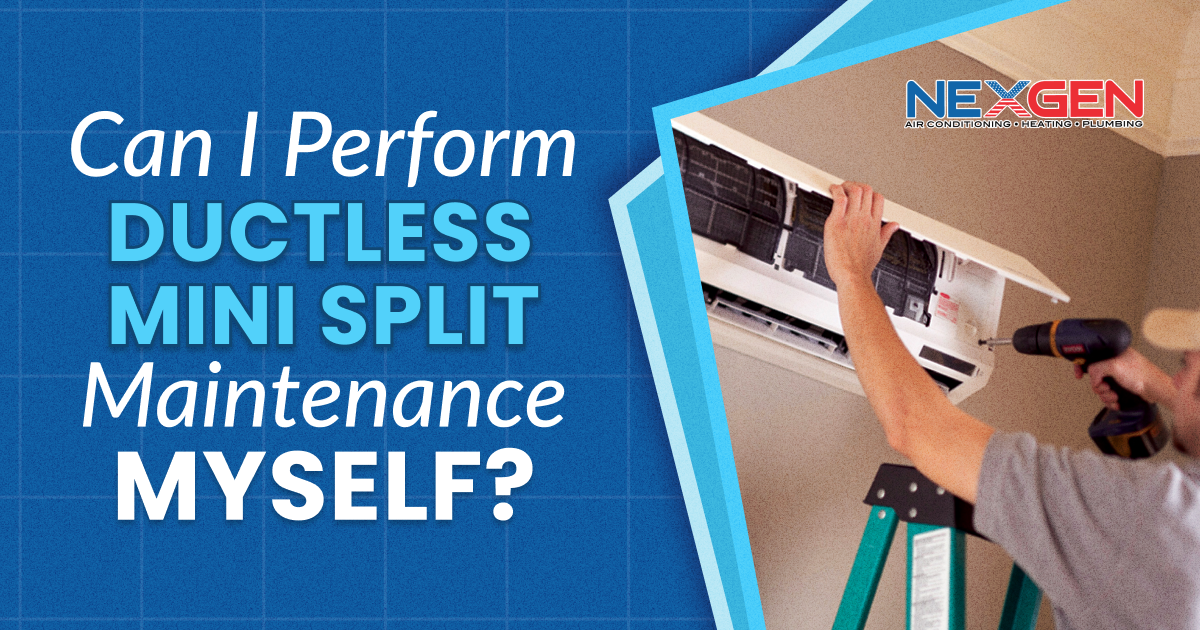
There are some types of ductless mini-split maintenance you can do yourself. While we recommend professional service twice a year to check electrical connections and for refrigerant leaks, drain hose blockages, faulty run capacitors, etc., we also encourage you to clean the system often. Here are some beneficial DIY maintenance tips to keep your ductless mini-split in top shape.
Clean or Change the Air Filters
Each indoor air handler has a filter. Depending on the model, the filter must be replaced or can be cleaned with a dry cloth before being re-inserted. Check the owner’s manual for the recommended interval and other instructions related to the model, but if your home is dusty or you have pets, check the filter more often. Otherwise, dust and dirt can build up in the system, causing it to work less efficiently and possibly leading to damage and a shortened lifespan.
Clean the Outside of Each Unit
If dust and dirt collect on the exterior of an air handler, particles can get inside and interfere with internal components. Dust the unit weekly to avoid any problems. This only requires a damp cloth and a gentle cleaning solution. Also, make sure the exterior of each vent is free from dust and dirt that can cause a clog.
Keep the Condenser Coils Clean
The condenser coils in the outdoor unit remove heat from the refrigerant. But if they’re dirty, heat transfer can be impeded and the system won’t work properly. Follow the care instructions in the owner’s manual to clean the coils. Generally, condenser coils can be sprayed clean with a garden hose, while the remaining debris can be removed with an AC coil cleaning brush. Also, check the blower assembly and fan wheel for dirt, and clean them as necessary. Just remember to turn the unit off before you get started.
Make Sure the System’s Pipes Are Clear
Dust and debris can block the drainage pipes between the indoor and outdoor units. The system will then struggle to maintain a comfortable temperature. To avoid trouble, clean the pipes by vacuuming the dirt out or clearing it with a brush. Call a professional if the clog is deep or you’re unable to clear the line.
Clear the Area Around Each Unit
Make sure no furnishings, objects, or clutter are blocking the ductless mini-split unit. If there’s not enough space around it, airflow can be restricted and dust can accumulate in the system. Ideally, large furniture, bookcases, and artwork should be kept at least four feet away from the unit.
Protect the Outdoor Unit in Winter
Snow, ice, and debris from trees can prevent the outdoor unit from running normally. Check it often during the colder months. Gently remove any snow and ice you find. Otherwise, it can cause serious damage that is expensive to repair. To prevent issues, mount the condenser unit above grade and place a protective plywood cover on top to avoid contact between the equipment and debris or moisture.
Schedule Ductless Mini-Split Maintenance with NexGen
Your mini-split system provides heating and cooling, so it should be inspected and cleaned by a professional twice a year. At NexGen, our licensed HVAC technicians will ensure your system gets the care it needs. Routine service and repair discounts are included in our maintenance plan. Continue reading to learn more about maintaining your ductless mini-split system; to schedule service, call (805) 301-6788 today.
6 Ways to Keep Your Brick House Cool in the Summer
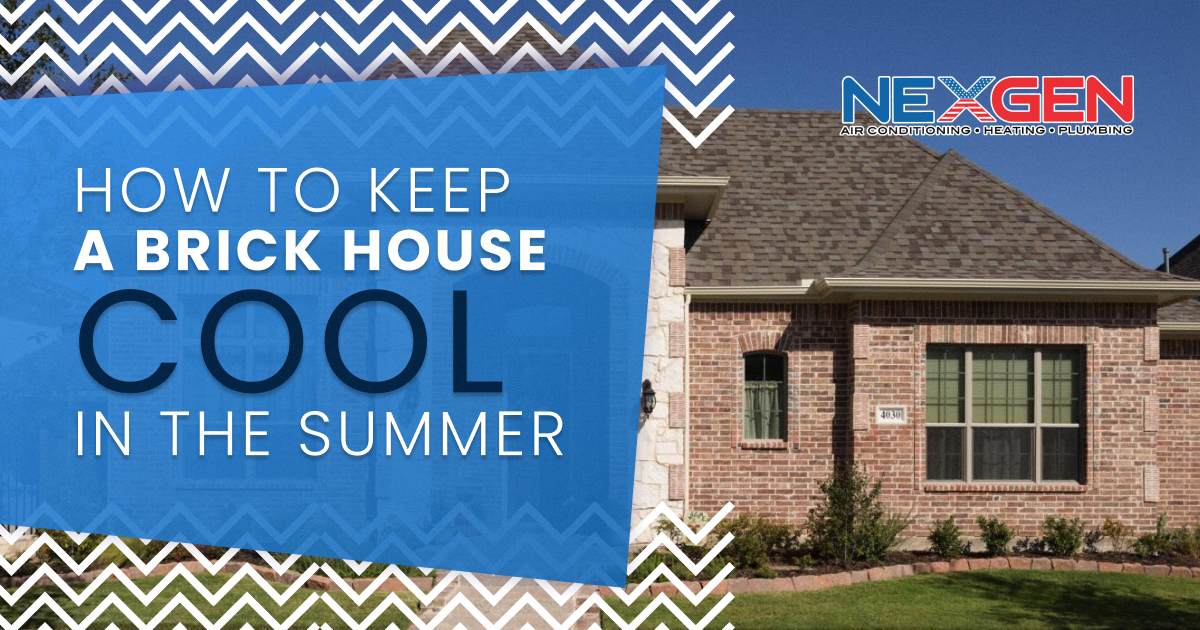 NexGen provides air conditioning services for all types of homes in Southern California. We know installing an AC requires considering a building’s size and construction materials. For example, brick is highly effective at holding heat. Therefore, it can be challenging to determine how to keep a brick house cool in the summer.[/caption]
NexGen provides air conditioning services for all types of homes in Southern California. We know installing an AC requires considering a building’s size and construction materials. For example, brick is highly effective at holding heat. Therefore, it can be challenging to determine how to keep a brick house cool in the summer.[/caption]
Brick houses get so hot because bricks are great at absorbing heat from the sun. This thermal energy is stored and released into the air and other building materials, providing a persistent source of heat that keeps your home uncomfortably warm. The thermal mass of brick, or its ability to store and release heat over time, is a downside compared to advantages such as its strength and durability.
How to Cool a Brick House
A brick home isn’t destined to always be hot. There are effective ways to control its temperature and allow your AC system to run more efficiently. These include:
Insulating Your Home
Whether installed during construction or a retrofit, insulation slows the transfer of heat between exterior and interior walls. Therefore, the amount of heat released to the interior is limited. Insulation will also prevent bricks from heating up. Your walls will then stay cooler and radiate less heat, thereby contributing to cooler indoor temperatures.
Block Direct Sunlight
Direct exposure to sunlight will counter any efforts you make to cool your brick home. To reduce the heating effect of sunlight, you can:
- Keep Your House Shaded: Plant trees, bushes, and shrubbery around the outside of your house, so sunlight won’t reach brick walls.
- Protect Your Windows: Double-glazed windows, blinds, and shades help block sunlight that can quickly heat your home. Also, keep windows closed to prevent hot air from entering.
- Block Sunlight: Awnings and external claddings prevent sunlight from reaching heat-absorbing bricks. Lighter-colored bricks and paints reflect sunlight and help limit heat transfer.
- Install Reflective Roofing Materials: Replace dark tiles or shingles with metal and reflective coatings. Lighter-colored materials will reduce your roof’s ability to absorb heat, keeping your home cooler.
Seal Cracks Around Doors and Windows
The smallest gaps can let in hot air and allow cool air to escape. Check for drafts around or near doors and windows. Small cracks can be sealed with caulking. An expandable foam spray can be used to seal larger gaps. Weatherstripping is also an effective seal. Call a professional if there are many large cracks or if you suspect structural damage.
Use Clay Bricks Instead of Concrete Bricks
If you’re constructing a brick home, choose clay which has a lower thermal mass than concrete. Clay absorbs heat more easily. But it also releases it faster rather than radiating heat throughout the night.
Use Fans Wherever Practical
Fans don’t cool the air, but they can help lower your body temperature. You can also place them wherever you need a cool space. Ceiling and portable fans are particularly effective for small rooms, whether your home is made of brick or not. You can use several of them for cost-effective cooling.
Install and Maintain an Air Conditioning System
Installing an air conditioner isn’t the cheapest option. But it is effective at providing cool air in a brick home. If you set the AC to a comfortable temperature early in the day, it will keep the bricks cool to start. Bricks retain cold quite well, especially if your home is well-insulated.
NexGen Can Help Keep Your Brick House Cool in the Summer
Our fully licensed and insured technicians install, repair, and maintain air conditioners throughout Southern California. We’ll evaluate your home to determine the best type of AC system for you. The systems we install and service include central units, ductless mini-splits, packaged units, and heat pumps. Our team can also install attic insulation and energy-efficient window coverings to help keep your home cool. To learn more, call (833) 729-9735.
How Does a Split AC Work In a Larger House?
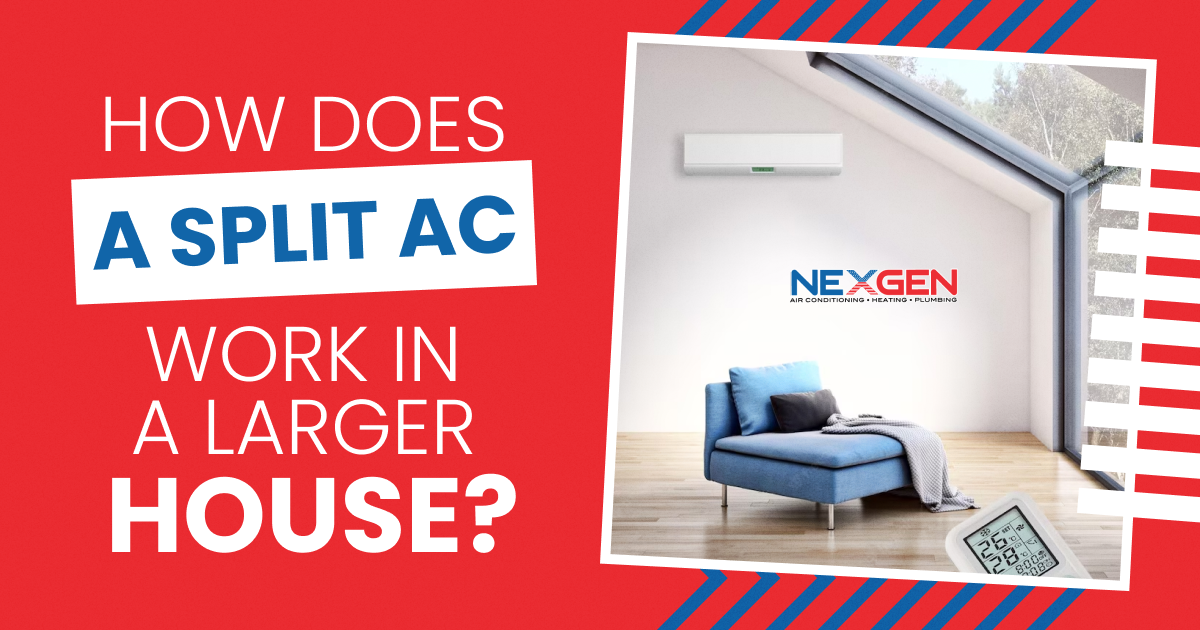
NexGen is known for high-quality air conditioning services in Southern California. Our licensed and insured technicians can install any type of system, including a ductless mini-split AC. Mini-split systems are often recommended for smaller homes, older properties, and those where it’s more difficult to install ductwork. Highly versatile and flexible, they can also accommodate a larger home. If you’re wondering, “How does a split AC work for a larger house?”, we’ll look at what you need to consider when setting one up.
How Does a Mini-Split AC Work?
Split ACs, whether single- or multi-zone, have one outdoor compressor/condenser unit. Depending on the system’s type and configuration, the outdoor unit can be connected by refrigerant tubing, a power cable, a condensate drain, and suction tubing to one or more indoor air handlers. Each air handler can be controlled individually, so you can set the temperature as you like for one room or area.
How Many Mini-Splits Do I Need?
You can connect up to eight air handler units to a single condenser unit. But whether this is necessary depends on your home. The system can be expanded with additional units if you decide to build a home addition or convert a basement or attic to a living space.
Whether you need a mini-split for every room depends on your needs. For example, you might like a cooler bedroom while other occupants like it warmer in their bedrooms. Or, you might want the living room warmer and the home office cooler.
As you can see, installing a mini-split AC system requires a lot of planning. But you don’t necessarily need an air handler in every room. This can be expensive in a large home. A single “zone” can include multiple rooms or even an entire floor. It just needs proper airflow to provide sufficient cooling or heating.
Mini-Split AC Size vs. Square Footage
Installing a system that’s the right size is key to how a split AC works in a larger home. A mini-split system’s size is determined by its capacity in British Thermal Units (BTUs). A BTU is a measure of how much energy it uses to remove heat. Here are some examples of room sizes and the capacity required for them:
- 150 to 200 Ft2: 6,000 BTUs
- 300 to 350 Ft2: 8,000 BTUs
- 400 to 500 Ft2: 12,000 BTUs
- 600 to 700 Ft2: 18,000 BTUs
- 1,200 to 1,500 Ft2: 36,000 BTUs¹
Consider Distances
The indoor units and condenser are connected by a conduit, which requires a 3-inch hole in an exterior wall. If you spread a mini-split AC system over multiple rooms and floors, the distance between the farthest head units and the outdoor unit affects how far the refrigerant must travel. The longer this distance, the less efficient the system can be due to friction, the energy required to pump the coolant, and heat transfer between the lines and ambient air (insulating the lines can minimize heat loss).
Depending on the make and model, refrigerant lines can extend 66 to 98 feet from the outdoor unit. This works for most houses. But if you require head units installed at longer distances, or exceed the number of units a condenser can handle, another outdoor unit can be added.
Call NexGen Today
“How does a split AC work in a larger house?” is a question we can easily answer. The experienced technicians at NexGen will explain the process and evaluate the needs of your home. Configuring different zones allows you to set the temperature perfectly for each room. To learn more about ductless heating and cooling systems, schedule a consultation, and learn about options and financing, call 833-729-9735 today.
Source:
What Types of Tools Are Needed for AC Installation?
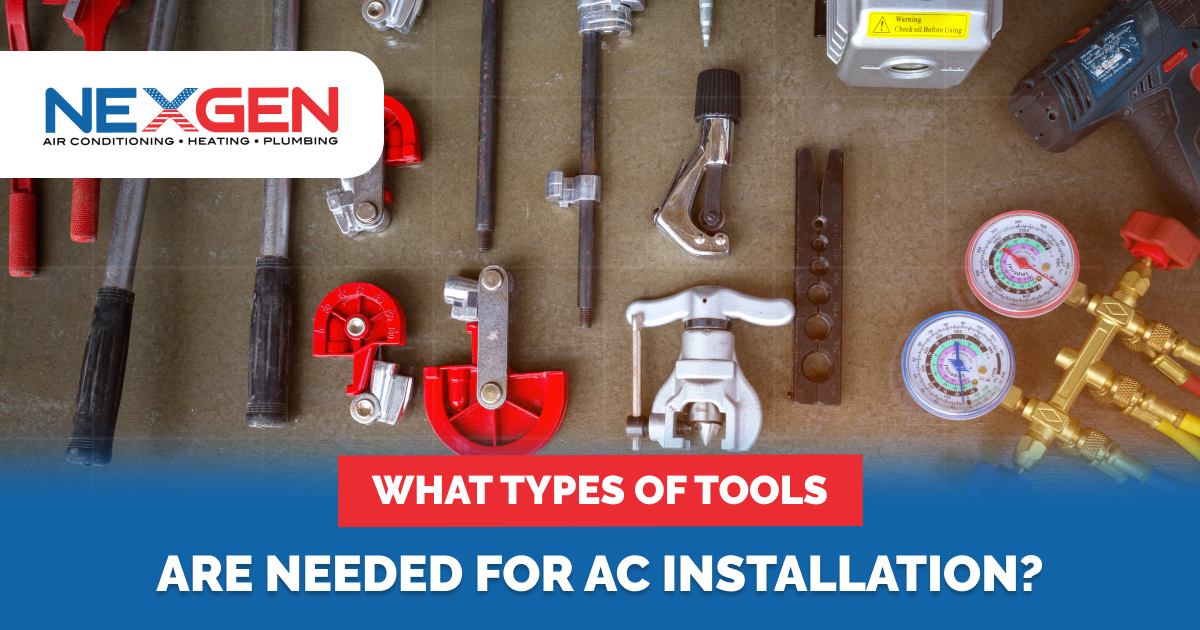
At NexGen, we strongly advise against DIY installation, no matter what type of AC system you’ve purchased. Most air conditioning systems have numerous components. All these must be properly installed for the unit to work safely, reliably, and efficiently. Nonetheless, many clients ask us about the AC installation process, including the types of tools we use.
There are many items in a professional AC installer’s toolkit. Here’s a look at a few tools our technicians use:
- Screwdrivers/Nut Drivers: Chances are, you have a screwdriver or two sitting around in your home. At the very least, you’ll need a multi-purpose screwdriver (with flathead and Phillips bits). Cabinet Bit, Keystone Bit, Slotted Screw, or Allen Recess screwdrivers may also be needed. It’s wise to have a magnetic nut driver set as well; hex-head nut drivers may be required for some parts.
- Hacksaws: Saws help cut copper tubes and other metals. The type of metal determines the size of the blade required. Blades are rated by their size in inches and number of teeth; the thicker the metal, the more of each you’ll need. The pros use high-quality tungsten or molybdenum steel blades.
- Hand Seamers/Snips: With a hand seamer, an AC installer can bend or flatten sheet metal. Snips help cut it to the required size. Similarly, an awl is used for scoring sheet metal to help make a straight cut or punch holes in it, while a crimper helps conform metal parts to a section of piping. A high-quality tool has insulated grips.
- Wrenches: A wrench helps fasten copper or brass nuts to bolts in your HVAC system. Various-sized tools are often needed. A Box wrench has a strong, tight grip. Open-end wrenches slide onto a nut or bolt more easily. Socket-type wrenches are commonly found in homes and are suited for some HVAC fasteners. A set of pipe wrenches is also useful.
- Vises: These work tools hold parts with a jaw made of copper, aluminum, or another soft metal. The material a vise is made of avoids damaging parts being worked on during AC installation.
- Power Drills: HVAC technicians often use a cordless, battery-powered drill for versatility (they often keep a spare charged battery in their toolbox). A 24-volt drill with numerous types of bits is best. A twist drill may be used to install plastic or metal components.
- Taps: Made of hard alloy steel, a tap is used to cut threaded holes in metal parts. An HVAC tech may use a taper tap to start a cut, a plug type to cut blind holes, and a bottoming tap to cut full threads to the base of holes.
- Files: Various metal surfaces and parts may need to be cleaned and smoothed out. Single- or double-cut files can be used for this. They can range in length from 4 to 12 inches.
- Multimeter: Every AC system has a specific voltage requirement. It should be listed in the user manual, on the packaging, or on the unit. A multimeter helps verify the electrical current at the site you’re connecting the AC to matches the system’s requirements. If not, the unit won’t work properly or can cause serious electrical damage.
- Pressure Gauges: AC service techs often carry refrigeration gauges, manifold gauges, and similar tools to measure pressure and check for leaks. An experienced technician may carry multiple sets of gauges.
- Staple Gun: A staple gun allows an installer to assemble ductwork during AC installation. It also helps secure joists.
- Nitrogen Regulator: A nitrogen regulator reduces the pressure of gases or liquids so they are safer to work with. Without it, a high-pressure gas or liquid is released all at once.
- Psychrometer: A device that can measure air flow, evaluate an air mixture, and measure relative humidity.
- Safety Tools: HVAC technicians wear gloves, goggles, and masks to protect themselves from dust and debris. Ear protection is often worn when operating power tools. Heavy steel-toe work boots prevent slipping (especially when working on ladders) and offer protection if an object falls on a worker’s foot.
Hire NexGen for Your Next AC Installation
As you can see, an AC installer carries an arsenal of tools. It would be quite expensive to buy all these for a one-off install. Plus, you risk operational issues due to installation mistakes or causing damage that’s costly to fix. At NexGen, our crews are fully trained, licensed, and equipped to install any type of air conditioner. To schedule AC installation in Southern California, receive a friendly estimate, or learn about financing, call (805) 301-6788 today.
When to Schedule an AC Leak Repair Service
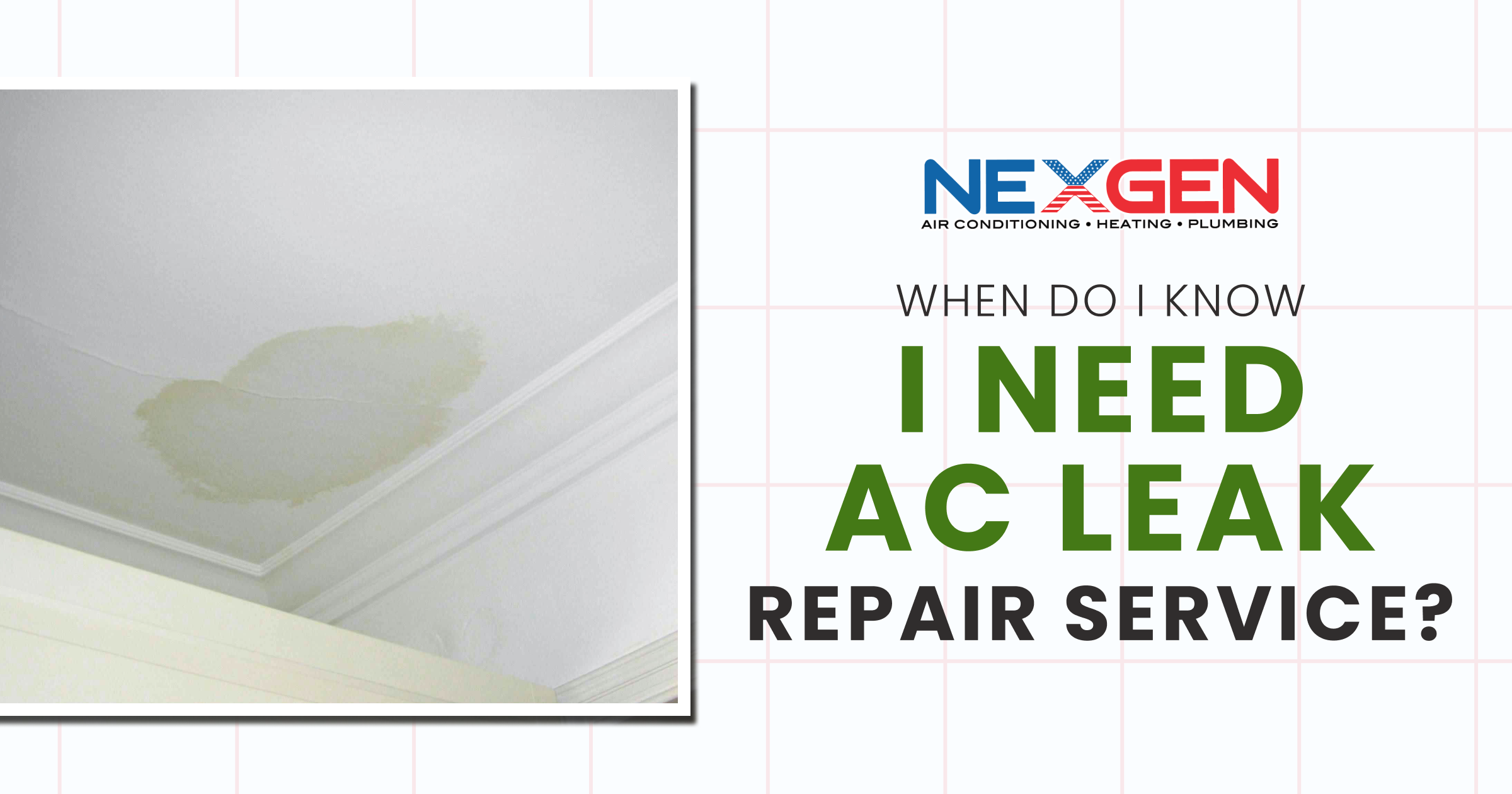
Refrigerant is what enables your AC to absorb heat and cool your home. A coolant leak can cause the system to malfunction and break down. An air conditioner can also leak water. No matter what is leaking from it, the unit needs to be repaired before it’s seriously damaged. Sometimes a leak is barely noticeable. But an air conditioner is good at signaling problems. We’ll look at the common signs of leakage so you know when to schedule an HVAC leak repair service.
Signs of a Refrigerant Leak
A refrigerant leak can originate from the evaporator coil in the air handler, a capillary tube in the condenser unit, or flare fittings where tubing attaches to an AC component. Since your AC requires refrigerant to function properly, the signs of a leak include:
- A Lack of Cooling: Your AC won’t cool the air effectively if it’s low on refrigerant. There will be less to transfer heat away. A dirty filter can prevent an AC from cooling, but if this isn’t the issue, have the unit inspected for a leak.
- Prolonged Cooling Cycles: An air conditioner should cycle in regular intervals, especially when outdoor temperatures don’t change much. But if it’s leaking refrigerant and your home doesn’t get cool enough, it will run longer to compensate.
- Hissing Sounds from the Indoor Unit: A small leak can emit a hissing sound as refrigerant escapes tiny holes and cracks. If the sound is more like bubbling, a larger leak is likely.
- Increased Indoor Humidity: The heat exchange process removes moisture from the air. But if your AC unit isn’t working effectively, its ability to remove humidity will be restricted, increasing dampness and possibly leading to mold growth.
- Frozen Evaporator Coils: When the system can’t absorb heat, the coils get colder and excess condensation can form and freeze. Ice further restricts heat transfer and can damage and break the coils in extreme cases.
- An Exhaust-Like Odor: AC refrigerant is a chemical substance. If it’s leaking, it will release fumes into the air, so the smell of acetone or a fruity or sulfur-like odor may proliferate.
- A High Electric Bill: A refrigerant leak will make your AC work harder. In the process, it will use more energy, so your electric bill will suddenly go up.
A refrigerant leak is extremely dangerous, aside from the other inconveniences it causes. The fumes are a health hazard. Seek medical help if you suspect a leak and experience dizziness, shortness of breath, nausea, loss of focus/coordination, or severe throat, nose, or sinus pain; these are signs of refrigerant poisoning.
Why Your AC May Leak Water
Air conditioners are designed to extract moisture, but a water leak is not a minor issue. It can cause major damage. Professional leak repair services can address the causes of an AC water leak, such as:
- Low Refrigerant Level: If there's less refrigerant, frost and ice can form on the evaporator coil. Water will then drip onto components below it. If your home isn’t getting cool and you hear telltale sounds of a coolant leak, your AC may need leak repair.
- Clogged Drain Line: A clogged condensate drain line is a common cause of an AC leaking water. Dust, dirt, and mold can block the line, preventing water from draining outside. The condensation backs up and has nowhere to go but into your home.
- Blocked Air Filter: If the filter is dirty enough, it can block the flow of air over the evaporator coil, causing it to get cold and freeze. Melting water can fill the drain pan and cause it to overflow. Change the air filter often to prevent poor airflow, excess wear, and damage.
- Broken Drain Pan: When an AC drain pan appears old, rusted, or cracked, have it replaced by a professional. Even if the unit is still working after 12 to 15 years, the drain pan may have worn out.
- Failed Condensate Pump: If the condensate pump breaks, it won’t pump water outside. A technician can determine if it’s working or not and repair or replace the pump as needed. This will stop water leakage and prevent water damage in your home.
NexGen Provides AC Leak Repair Services
At NexGen, our fully licensed and insured technicians can quickly troubleshoot, diagnose, and repair your AC system if it has a refrigerant or water leak. We are available 24/7 for emergencies. Whether your air conditioner isn’t cooling, won’t drain properly, or has a damaged coil, our team will fix it right the first time and avoid any further hazards or damage. Contact us online or call (833) 729-9735 to schedule AC repair.
Understanding Summer Air Conditioner Repairs
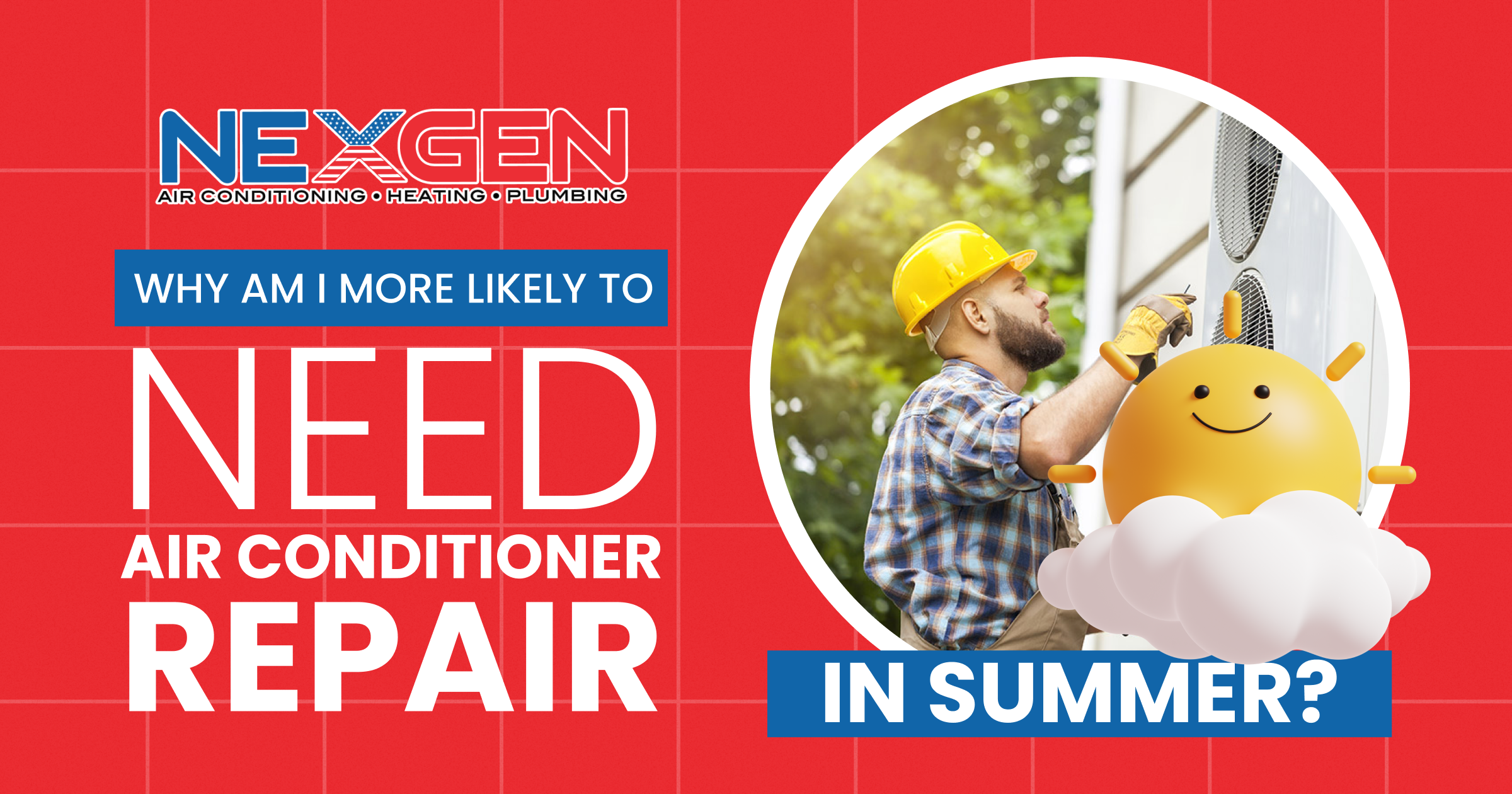
The Filter Is Clogged
Your air conditioner is on most or all of the time in summer, so the air filter will clog up more quickly. As dust and dirt get trapped, the system will become more inefficient. A clogged filter can cause it to overheat and shut down. If the unit freezes due to low airflow, it can produce less warm air or turn off.
Disruption of Airflow
When the evaporator coil freezes, there’s usually an issue that’s causing poor airflow. Air must blow over the coil to supply heat for it to absorb. Otherwise, condensation on its surface will freeze. Low refrigerant will also reduce the heat absorption rate.
A blockage in an air duct or a closed register can also impede airflow. The issue can be due to a fan problem as well. If a fan run slowly or not at all, it will reduce airflow and trigger other issues. A faulty thermostat or a malfunctioning air handler could also cause a lack of airflow.
Clogged Condenser Coils
Designed to expel warm air, the outdoor unit’s condenser coils are prone to clogging up with dust, debris, and grime, especially when air pollution is high. If a coil is clogged, it restricts heat transfer. Your AC will work harder, increasing wear and tear, which can cause it to break down or fail prematurely.
As the coils start to clog, the system will consume more energy, so your utility bills may go up. A spike in your monthly bill is a reason to call a professional. Prompt fixes can avoid more costly air conditioner repairs.
Component Failures
Your AC system’s moving parts work harder in the summer. These include the evaporator coil fan, condenser coil fan, fan motors, fan belts, expansion valve, and dampeners. A broken fan blade can reduce system performance. If your AC isn’t working properly, it may also be due to faulty wiring or a problem with a thermostat sensor. Capacitors, typically found on the unit’s circuit board, can fail due to wear and tear, or they can decline in strength, affecting system performance.
Electrical Malfunctions
Aside from an overheated capacitor, air conditioners can develop wiring, contactor, relay, transformer, switches, and other problems that disrupt their electrical flow. Since an AC runs on electricity, such an issue will prevent it from working properly, if at all. Air conditioners are susceptible to electrical problems in summer due to frequent usage and exposure to harsh conditions such as hot temperatures, air pollution, rain, hail, and falling debris.
Lack of Maintenance
Regular maintenance allows technicians to catch problems early and fix them. Breakdowns and major repairs can be avoided. If your AC hasn’t had spring maintenance, it’s at a greater risk of needing repairs in summer (that’s when it’s under the most strain). Such is also the case if the system is outdated. If your AC is over 15 years old, it may be near the end of its useful life, a time when it is most likely to need another repair. The summer heat can put the unit over its tipping point so it stops working.
Call NexGen for Professional Air Conditioner Repair
At NexGen, our licensed professionals repair all common AC problems. We’re Google Certified for Home Services and have highly experienced repair technicians who arrive with replacement parts to get your AC working as quickly as possible. We also offer warranties of up to 12 years and have financing plans available to make budgeting easy. To request air conditioner repair in your Southern California home, call (833) 729-9735 today.
How To Protect Your AC When the Pollen Count Is High
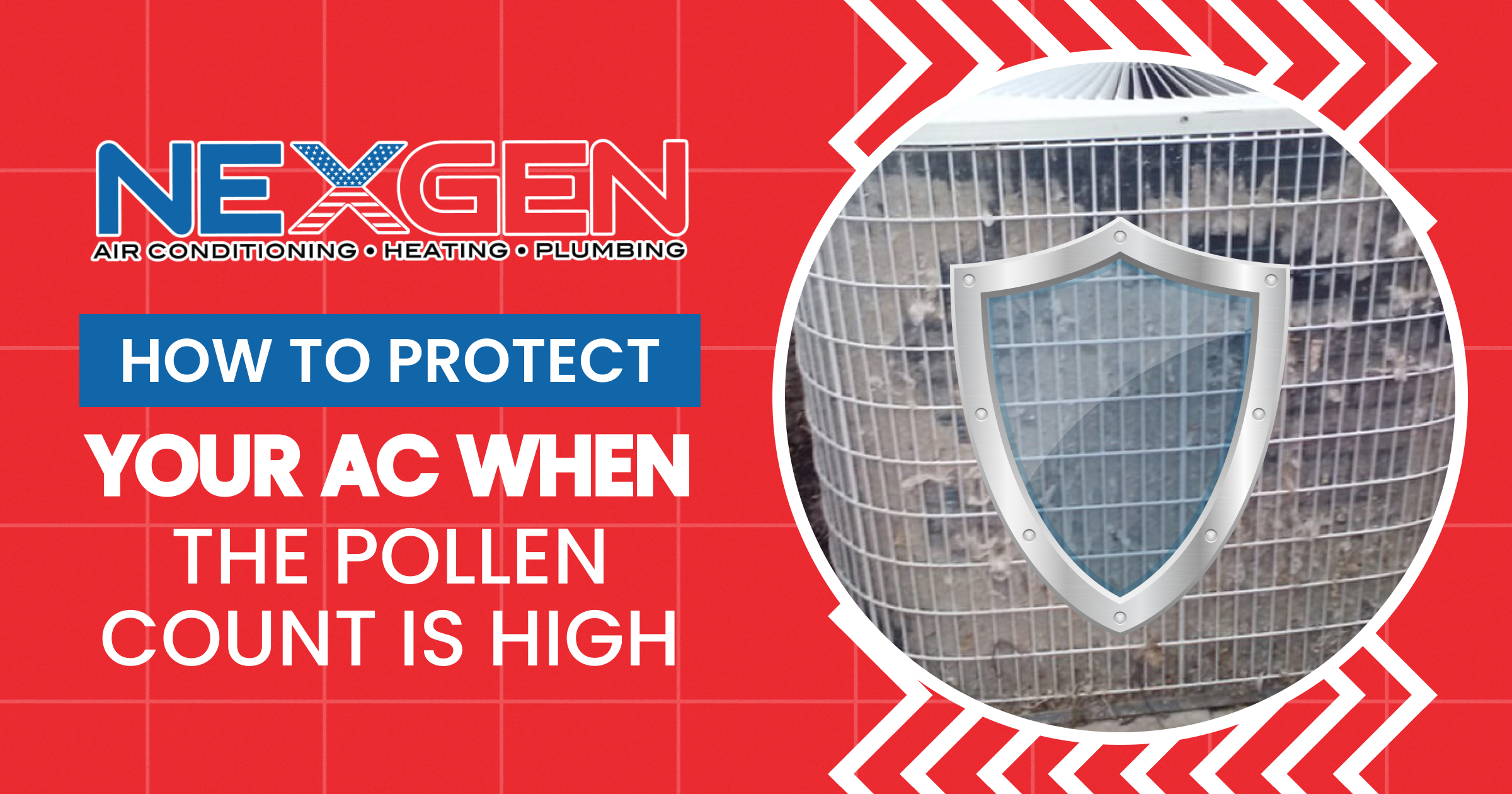
Spring blooms mean pollen is in the air. Pollen from trees, grass, and flowers stays suspended until it settles or you breathe it in. The tiny grains can trigger allergy symptoms and asthma attacks. Pollen also settles on surfaces, so it can mix with dust and build up in your HVAC system. Therefore, numerous issues can occur when the pollen count is high.
Pollen can affect your AC when it builds up on the evaporator coil. This makes it harder for the unit to absorb heat and transfer it out of your home. If pollen settles on the condenser coil, the system will struggle to release heat, causing your air conditioner to overheat, shut down, or be seriously damaged. But here are ways to protect your AC from pollen:
Close the Windows
One of the best defenses against pollen is a physical barrier. While it may be tempting to open windows in mild weather, closing them can keep pollen and other particulates out. Therefore, you can improve indoor air quality and get relief from allergies. The same pollen that triggers your symptoms also won’t reach your air conditioning system.
Clean the Area Around the Outdoor Unit
Debris, including plants, branches, and leaves, can cause pollen to blow into the outdoor condenser unit. To protect it, trim vegetation a few feet away on each side. You can also prevent plants from growing nearby by installing paver bricks or gravel around the unit.
Wash Off the AC
Rinsing off the outdoor unit with a garden hose can wash away pollen and particles. If pollen settles on the unit, it can drift or blow inside. Washing the unit at medium pressure can eliminate grains, powder, and residue so they don’t cause problems.
Change or Upgrade the Air Filter
Indoor air circulates up to six times per hour. This gives pollen plenty of opportunities to blow into your home and clog up your AC filter. Check the filter every week when the pollen count is high. Clean or replace it when the filter has a lot of buildup. The longer you wait, the more pollen, dust, and debris will collect inside.
If the filter clogs quickly, or you have allergies and indoor air quality issues, upgrade your HVAC filter. Some filters use an electric charge to attract particles. But a high-efficiency particulate air (HEPA) filter will remove very fine particles, including pollen grains.
Schedule a Duct Cleaning
The air filter should trap most pollen in the air. However, pollen grains can still circulate and eventually settle in your ductwork. They can reenter the air supply when the AC turns on. In addition, pollen and other debris can form a coating that increases air friction, forcing your AC to work harder. Just a thin layer can interfere with airflow and prevent the unit from cooling your home efficiently.
Install a Whole-Home Humidifier
Dry air makes it easier for pollen to remain suspended and circulate. A humidifier can increase the moisture content, which helps because moisture weighs pollen down. It also helps relieve dryness in your nose and throat which can exacerbate allergy symptoms when the pollen count is high. According to the U.S. Environmental Protection Agency, optimal indoor humidity levels range from 25% to 40%.
Are My Allergies Connected to My Air Conditioner?
If your allergy symptoms are due to contamination in your AC, you may experience sneezing, wheezing, and congestion; dry, itchy skin; and possibly nosebleeds. You may feel irritation and congestion while at home that goes away when you leave. If there’s a mold or mildew smell, or dust or pollen is visibly floating in the air when windows are closed, your AC is almost certainly affected.
Contact NexGen
NexGen provides high-quality HVAC and indoor air quality services, including air duct cleaning, to protect your AC and home regardless of the pollen count. Pollen can contribute to ductwork contamination and blockages. Excessive amounts of particulates in your home can be due to poor sealing. At NexGen, we can help with all these issues and protect your air conditioning system. Call (833) 729-9735 to request service.


















